Concerted Action for Sustainable Peace: IPYG
In 2020 and 2021, the youth were widely affected by the pandemic, during the insecure and difficult times. They weathered a disease from a virus infection, a mental health challenge named the COVID-19 blues stemming from social distancing and was also exposed to cyberbullying.
School shutdowns to contain the spread of COVID caused education disruption for more than 1.6 billion students in over 160 countries. It caused students the opportunity for future development. Moreover, it often exposed young people to violence and human rights violations at homes and workplaces, and some were forced into armed conflicts. Also, students living in poverty had to go starving because school cafeterias were closed. Amid these challenges, youth leaders who work with the IPYG have strived to build a stable social foundation and help students overcome their sufferings. One youth member from Timor-Leste gave English and Peace Education lessons to students eager to learn and gave them hope. A young gentleman from South Sudan went to neighborhoods with no internet access on a bicycle to educate the community about viruses and sanitation.
Youth Empowerment Peace Workshop (YEPW), A discussion platform for youth around the world
To extend the helping hands of the youth, the IPYG worked for solidarity and cooperation of the global youth community. The answer for peace, the DPCW’s Article 10 on a culture of peace and peace education aligns with our work. Toward that effort, IPYG first launched a global discussion platform for the youth, the Youth Empowerment Peace Workshop, YEPW.
The online workshop which dealt with overcoming the pandemic crisis and building a sustainable future called for the youth to move proactively. In response, the youth joined the workshops hosted by continent. There, they shared the challenges in their region and launched collaborative projects to counter the issues.
Participants in Europe and the Americas discussed the rapidly growing cyberbullying and COVID-19 blues, and as a result, they are carrying out campaigns and classes to address cyberbullying.
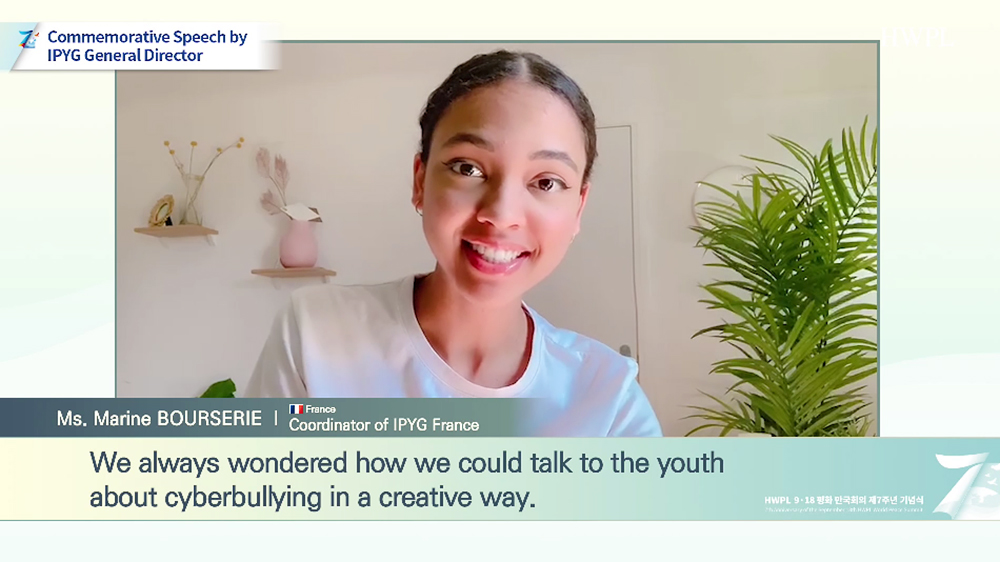
Ms. Marine BOURSERIE, Coordinator of IPYG France
“We always wondered how we could talk to the youth about cyberbullying in a creative way. As a result, an idea of a game simulation arose through interactive games — a topic of interest for so many youths recently. We were inspired by the concept where the story changes according to the user’s decision for each scenario. Many participants said they were impressed by the tremendous immersion and lessons the simulation gave. They became more aware of the consequences of the small choices, and some participants even said it was a time to reflect on their recent words and actions not only in the real world but also in the cyber world as well. We will continue to expand this cyberbullying campaign with much more content, and if the opportunity arises, we even plan to make it into a real online game.”
Youth Empowerment Peace Class (YEPC), Education for everyone including the youth and citizens
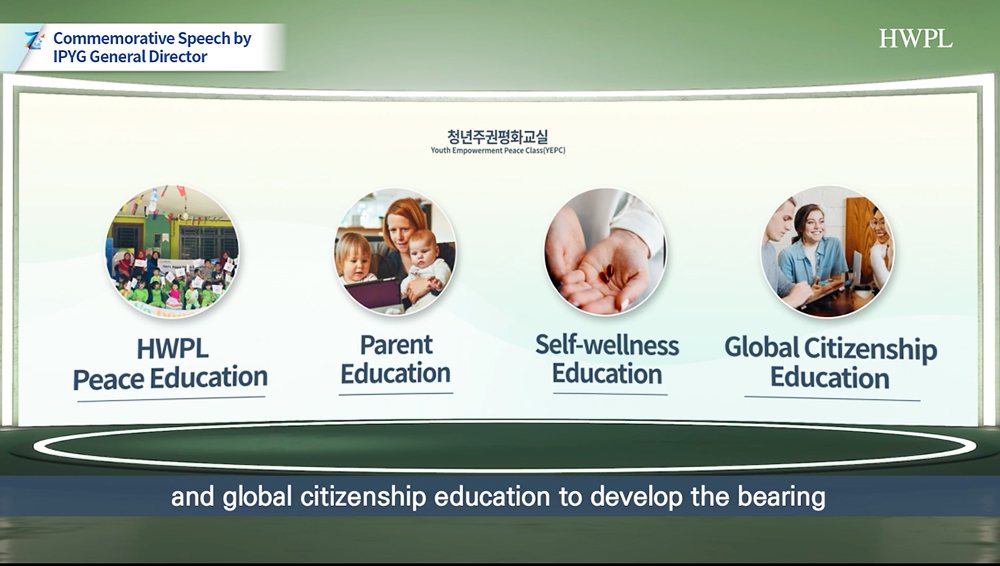
The youth in Africa and Asia discussed ways to resolve education disruption. According to a UNESCO research, even before 2020, half of the youth from ages 15 to 17 in the regions were unable to attend school, and the pandemic exacerbated the issue. The youth there reached out to the IPYG, and IPYG responded by launching non-formal educational program on an NGO level. It’s called the Youth Empowerment Peace Class or YEPC, which we run with youth members.
So far, more than 450 youth from 35 countries have signed up for YEPC. The courses not only provide HWPL’s peace education, but also has parent education on the importance of family and parental role, self-wellness education that raises awareness of the dangers of drugs and smoking, and global citizenship education to develop the bearing and conduct of citizens in an era of globalization.
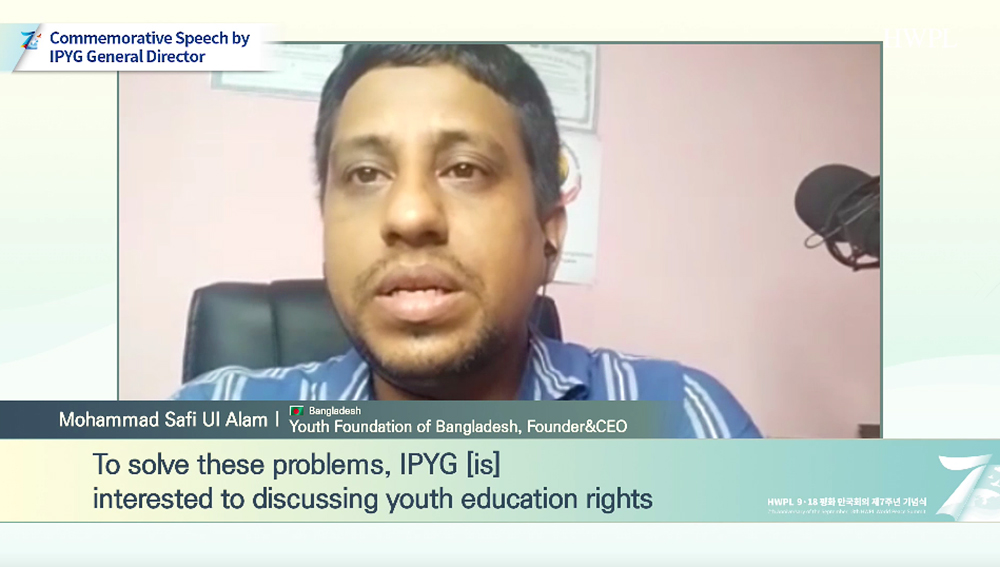 Mohammad Safi Ul Alam, Youth Foundation of Bangladesh(YFB), Founder&CEO
Mohammad Safi Ul Alam, Youth Foundation of Bangladesh(YFB), Founder&CEO
“You know that many young people are violated their right to study because the Internet infrastructure is not well-established. And young people cannot go to school properly due to the COVID-19 situations. To solve these problems, IPYG [is] interested to discussing youth education rights through the Youth Empowerment Peace Class (YEPC) and proposing solutions according to the situation of each country. I requested to work with IPYG to analyze the current situation and the current status of the local community and come up with appropriate measures to solve the educational rights and problem. The Youth Empowerment Peace Class (YEPC), which [is] called YEPC, is a very great initiative by the IPYG. Through this online platform in the pandemic, IPYG provides good quality education and created opportunities for young people who are not educated at home and even in schools.”
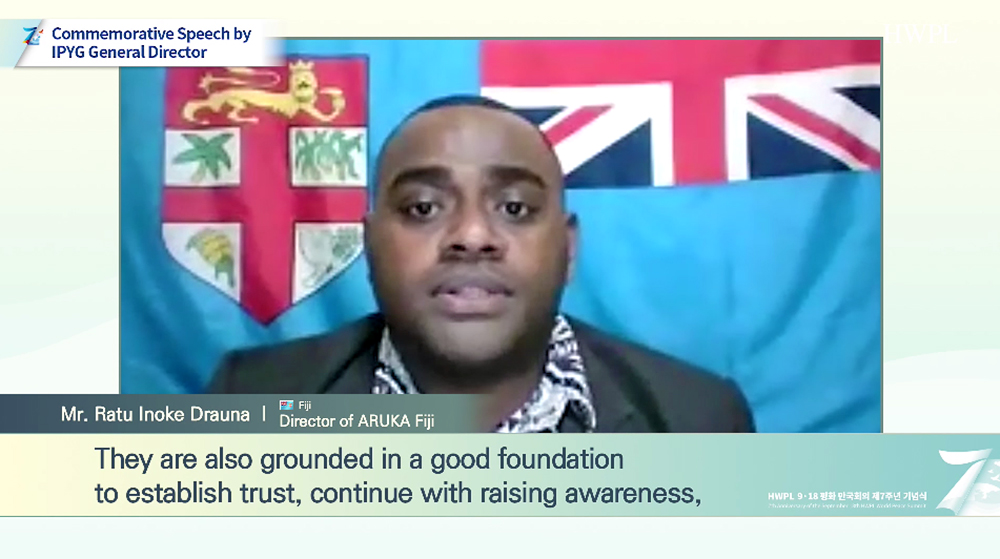 Mr. Ratu Inoke Drauna, Director of ARUKA Fiji
Mr. Ratu Inoke Drauna, Director of ARUKA Fiji
“As a network engaging needy widows and abandoned, disengaged, idle youth, it was a privilege to be affiliated under YEPW. Therefore, knowing of the courses offered by YEPC. YEPC is a very amazing educational program for youths, for it creates a platform to plan and implement ways to solve social and health prevailing issues. I believe the highlight of our training was HWPL Peace Education and Parent Education, as many participating were able to relate to this and share their childhood testimonies and learn from each other’s stories. I believe, after being trained with YEPC, many of our members will now have a structure towards being mindful of their approaches in working with young people. They are also grounded in a good foundation to establish trust, continue with raising awareness, and implement projects to boost the needs of what they had been taught. Therefore, we are so blessed being a part of this training initiative. Thank you, Dhanyavaad and Vinaka Vakalevu.”
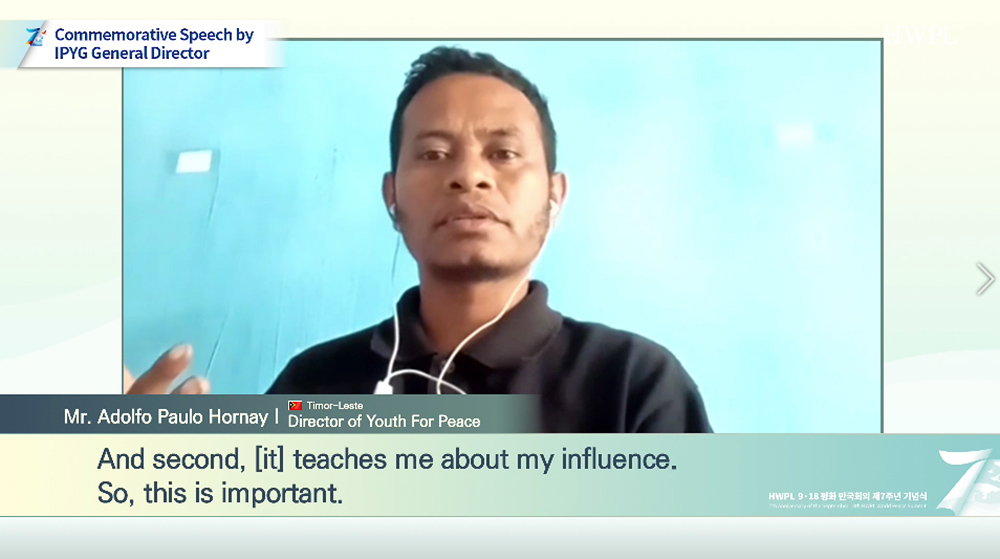
Mr. Adolfo Paulo Hornay, Timor-Leste, Director of Youth For Peace
“Peace education teaches me to know who [I am]. So, my value. And second, [it] teaches me about my influence. So, this is important. I know myself and my influence [on other] people. We need to know our role and our possibility to do the peace activity, peace event, or peace information to pass it to another person, [other] people, [other] young people, who really need peace itself. The Youth [Empowerment] Peace Class made our organization members understand about the peace activities from IPYG and HWPL to develop, expand the IPYG’s and HWPL’s activities in our family, in our community, in our country, and also, in our Earth as a global citizen.”
YEPW, which was launched in 2020, has hosted 60 sessions in 50 countries across six continents adding participating individuals and organizations every time.

Recently, we surveyed 179 youth members collaborating with the IPYG. The survey showed that 79% said that YEPW was helpful in providing an opportunity to interact with young people from other countries and participate in a cooperative global network. 78% responded that the YEPW made them realize the youth must take an active role in solving social challenges.
In addition, when asked about the necessity of a non-formal education program on an NGO-level, 98% responded they strongly agree or agree. The results show that the IPYG’s projects, aimed at realizing the DPCW, is recognized for creating a foundation for healthy, striving communities. Building on these records, the IPYG will continue to expand the youth solidarity and help raise citizens’ awareness through YEPW and provide educational courses on YEPC by growing their presence online.













